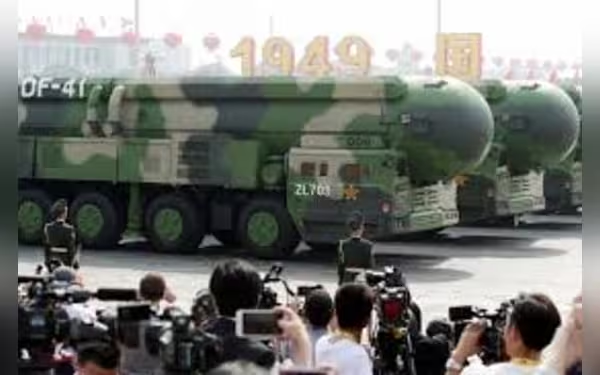Saturday, November 16, 2024 08:46 PM
Australia Seeks Explanation for China's ICBM Launch
- Australia demands clarification on China's missile test.
- China's ICBM launch raises regional security concerns.
- Pacific nations wary of escalating military tensions.
 Image Credits: thefrontierpost
Image Credits: thefrontierpostAustralia expresses concern over China's ICBM launch, seeking clarification amid rising regional tensions.
In a significant development, Australia has expressed its concerns regarding China's recent launch of an intercontinental ballistic missile (ICBM) that landed in the South Pacific. This event marks China's first ICBM test in decades, raising alarms not only in Australia but also among its allies in the region. The missile launch is seen as part of China's ongoing efforts to modernize its nuclear capabilities, which include air, land, and sea-based weapons.
An official from the Australian Department of Foreign Affairs stated, "The Australian Government has sought an explanation from China," highlighting the unease surrounding this military action. The spokesperson further emphasized that Australia is worried about any actions that could destabilize the region and increase the risk of miscalculations among nations. In light of this launch, Australia is consulting with its regional partners to address the implications of China's military activities.
Historically, China first test-fired an ICBM into the South Pacific during the 1980s, but since then, it has primarily conducted tests within its own airspace. This recent test is expected to draw criticism from Washington's allies, and the reactions from smaller Pacific Island nations will be closely monitored. The South Pacific is a strategically important area, rich in ocean resources and vital trade routes, making it a focal point for both the United States and China as they vie for influence.
Countries in the Pacific are eager to benefit from the competition between the US and China, yet they are also wary of the potential militarization of their region. Japan and New Zealand have already condemned the missile test, while China's military has labeled it as "routine." The Australian spokesperson pointed out that this launch occurs amid China's rapid military build-up, which is happening without the transparency and reassurance that many nations in the region expect from major powers.
As the situation unfolds, it is crucial for nations in the South Pacific to navigate these complex dynamics carefully. The balance of power in the region is delicate, and the actions taken by China, Australia, and their allies will have lasting implications for peace and stability. It is essential for all parties involved to engage in open dialogue and seek diplomatic solutions to avoid escalating tensions that could lead to conflict.













